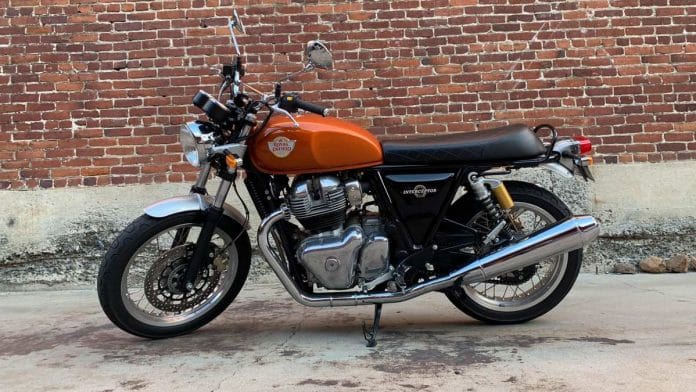New-age bikers in Bangladesh are tripping over a classic bike from India. Founded in 1893, motorcycle manufacturer Royal Enfield has been enthralling Indian bikers with its Bullet for generations. Now it has announced setting up a manufacturing unit and showroom in Bangladesh, and bike enthusiasts can’t have enough of the options the company has to offer.
On 21 October, four 350cc models—Hunter, Classic, Bullet, and Meteor—priced between Bangladeshi Taka 3.4 lakh and 4.35 lakh, were launched by IFAD Motors, the manufacturer and sole distributor of Royal Enfield motorcycles in Bangladesh. “According to insiders, IFAD Motors, which opened the Royal Enfield flagship showroom in Dhaka city’s Tejgaon area, will start delivering the motorcycles after 45 days,” The Business Standard reported.
Royal Enfield fans in Bangladesh can hardly contain their excitement. And they are making their love for RE bikes known to the world through social media reels and newspaper articles. In a viral Facebook video, an elderly man from Rangpur district, who traveled to Dhaka to buy a Bullet 350, confidently declares that he plans to ride it home at 140 kmph, adding that he can even ride with his hands off the handlebar.
“Culturally, Royal Enfield motorcycles have become a symbol of rugged masculinity. This trait has been celebrated in countless films in Hollywood and Bollywood and by notable personalities across the globe,” journalist Iftekharul Islam wrote. He said a noteworthy example is the 2019 film Kabir Singh, where the main lead, played by Shahid Kapoor, rides a G2 Royal Enfield Bullet. “It is an example of the rugged, alpha-masculine image, albeit controversial,” Islam added.
But a question arises: would this help bring down the India hate in Bangladesh and better the ties between the two countries?
Also read: Bangladesh protests have implications for India. New Delhi must engage at military level
‘Boycott India’ until when?
Since former Bangladesh prime minister Sheikh Hasina fled her country in August after a student-led movement, the country’s relationship with India has remained frosty at best. The fact that Hasina has been given refuge in India has not been welcomed by Dhaka.
“She has to be brought back, or the people of Bangladesh won’t be at peace. The kind of atrocities she has committed must be addressed through a trial here,” Muhammad Yunus, the chief adviser to Bangladesh’s interim government, said in an interview.
On its part, Delhi has repeatedly raised the issue of attacks on Hindus in Bangladesh as well as the release of terror convicts like Jashimuddin Rahmani, the chief of Islamist outfit Ansarullah Bangla Team. During his Independence Day speech at the Red Fort, Prime Minister Narendra Modi said 140 crore Indians are worried about the safety of Hindus in Bangladesh, who have faced attacks during the recent political unrest in the country.
But anti-India sentiment had been brewing in Bangladesh even before Hasina’s hasty exit. Soon after she returned to power for a consecutive fourth term on 7 January, the “Boycott India” movement began on social media. Popular Bangladeshi social media influencers like Pinaki Bhattacharya alleged that Hasina could retain power only because of India’s help and that she was nothing but a Modi stooge. They called for a ban on Indian goods and asked Bangladeshi actors to not work in Indian films.
“Photos of crossed-out Indian products like Amul butter and Dabur honey are circulating alongside barcode identification tips to boycott these goods. A single post highlighting the 890 prefix used in barcodes for Indian products garnered more than 1,000 shares, showcasing the movement’s online reach,” Al Jazeera reported in February.
Even before the ‘Boycott India’ campaign could end, student protests over quota took centre stage, leading to Hasina’s fall. Since then, trade relations between the two countries have slowed, with reports indicating reduced imports from India.
“After the government change, we observed a downflow in trade between the two countries. But I believe this is not permanent,” said Hafizur Rahman, administrator of the Federation of Bangladesh Chambers of Commerce and Industry, in an interview.
Royal Enfield’s grand foray in the Bangladesh market seems to have put a break on the ‘boycott India’ campaign.
“The arrival of Royal Enfield in Bangladesh isn’t just about selling motorcycles; it’s about bringing a slice of motorcycle history and a way of life that clicks with young people. Whether it’s the bikes’ affordability, old-school cool, or tough-guy image, Royal Enfield gets what young Bangladeshis dream about,” Iftekharul Islam wrote.
That should help tone down the India hate.
Deep Halder is an author and journalist. He tweets @deepscribble. Views are personal.
(Edited by Aamaan Alam Khan)






